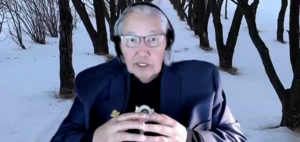“Changing the way we educate is key to reconciliation”
Posted on Tuesday, January 31st, 2023
On a snowy day in the Ottawa region, close to 100 learners, employees and other members of the Algonquin College community tuned in to engage with legendary Canadian Murray Sinclair, the former Chair of Canada’s Truth and Reconciliation Commission.
other members of the Algonquin College community tuned in to engage with legendary Canadian Murray Sinclair, the former Chair of Canada’s Truth and Reconciliation Commission.
His Honour, with a snow-covered backdrop of his own, joined participants from his home in Winnipeg for a virtual chat answering questions on a range of topics. The conversation was hosted by Jamie Bramburger, Manager, Community and Student Affairs at the Pembroke Campus.
A key point made by Sinclair was that “changing the way we educate is the key to reconciliation.”
Sinclair said Indigenization is more than just “checking a box,” adding that it’s not only colleges that are guilty of doing that: “Corporations are guilty of that. Governments are guilty of that. Everyone checks the box but those who actually implement what the box calls on them to do will be successful down the road.”
During the conversation, Sinclair answered questions submitted by the audience.
One attendee asked about Canada’s success in the implementation of the Truth and Reconciliation Commission (TRC) calls to action. Sinclair felt “Canada was not doing very well” in that regard.
“Within different categories, there are examples of good jobs, but they are not working collectively,” he said. “The Government of Canada doesn’t have a plan that includes where they are going to be next year, in five years, in ten years. You need to have a plan and the Government of Canada does not have a plan.”
Sinclair was also asked about schools offering courses in Indigenous languages. “I’ve met with several instructors who could put together courses available in Indigenous languages but it would need to modify the language to reflect the terminology,” he said. “The TRC report called for Indigenous learning sites where Indigenous people could come together for a full program of education in their languages. That is going to be easier to accomplish.”
When asked how reconciliation fits into Equality, Diversity and Inclusion, Sinclair said, “reconciliation is establishing relationships and changing the way we relate to each other.”
“We want to establish a relationship based on mutual respect,” he said, adding that, “Indigenous people need to be given opportunities for self-respect.”
Sinclair wrapped up the chat by adding that “the challenge is to think about the little people in (our) life — if you can explain this to a child in a way they can understand, then you are getting it.”
He concluded, “It’s about understanding relationships and how (people) should be treating each other. It’s a very simple thing in some ways.”
Read the Truth and Reconciliation Commission Calls to Action using this link.
- Posted in
- TRI News